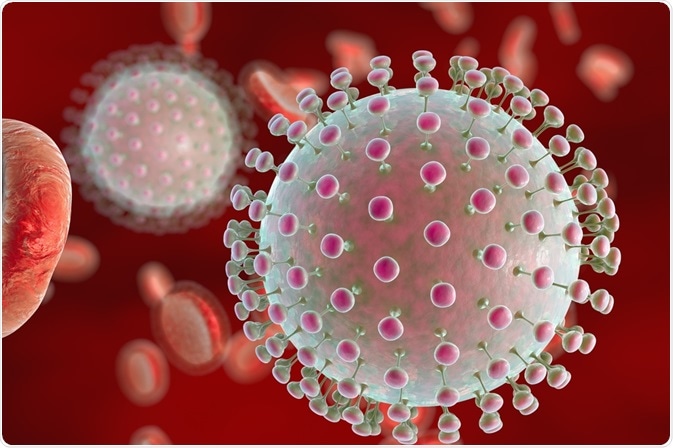Zika fever represents a mosquito-borne viral disease caused by Zika virus that has circulated in Africa and Southeast Asia but has recently spread through Latin America and the South Pacific. In November 2015, preliminary evidence suggested a potential association with an upsurge in neurological complications in adults (most notable Guillain-Barré syndrome) and microcephaly in neonates of mothers infected during pregnancy.
 Image Credit: Kateryna Kon/Shutterstock.com
Image Credit: Kateryna Kon/Shutterstock.com
Facts about Zika virus
Zika virus belongs to a group of RNA viruses and contains 10,794 nucleotides that encode 3,419 amino acids. Together with its close relative Spondweni virus, Zika virus forms a specific group within mosquito-borne flaviviruses, with the next nearest relative being the St. Louis encephalitis virus.
Even though flaviviruses replicate predominantly in cellular cytoplasm, Zika virus antigens can also be detected in nuclei of the infected cell. Infectious viral particles can be detected in human blood from the onset of illness, whereas viral RNA can be found even 11 days after onset.
While it is not effectively neutralized with 10% ethanol, Zika virus can be killed by ether, potassium permanganate, as well as by temperatures over 60 °C. Diagnostic techniques for Zika virus detection include PCR testing of acute-phase serum samples in order to detect viral RNA, but also other tests that screen for specific antibodies against the virus.
Growing research interest
Although Zika virus was only recently introduced to the Western Hemisphere, its relatives (such as dengue and West Nile virus) have been studied for a long time, providing a springboard that should accelerate Zika virus research and may result in novel approaches for the development of treatment options and vaccines.
In 2016, the US National Institute of Allergy and Infectious Diseases highlighted its interest in sponsoring research on Zika virus that would concentrate on developing sensitive and specific diagnostic tests, performing surveillance studies, developing animal models that could successfully mimic Zika infection in people, as well as identifying factors that influence virulence and host-range.
In response to the dramatic increase of microcephaly and Guillain-Barré syndrome across Latin America linked to the Zika virus, the European Commission decided to mobilize 10 million Euros for additional research that would result in improved diagnostic techniques and potential treatments.
Furthermore, PREPARE (Platform for European Preparedness Against (Re-) emerging Epidemics) joined forces with ISARIC (International Severe Acute Respiratory and Emerging Infection Consortium) in their endeavor to create standardized Zika virus research tools that would aid in collecting clinical and laboratory data from individuals infected with the virus.
Zika Virus 101
Treatment and vaccine research
Several vaccine platforms are currently investigated by different research groups. A DNA-based vaccine developed by researchers at the US National Institute of Allergy and Infectious Diseases employs a strategy comparable to an experimental flavivirus vaccine developed for the West Nile virus. This vaccine successfully induced immune response in a phase I clinical trial and was found to be safe.
Dengue virus vaccine also served as a template for the development of live attenuated Zika vaccine, whereas the approach with genetically engineered vesicular stomatitis virus (which yielded some success against Ebola) is at the early stage, waiting for experiments in both tissue culture and animal models.
US National Institute of Allergy and Infectious Diseases also employed the existing antiviral screening program for other flaviviruses (such as yellow fever and West Nile virus) in order to create a test for examination of compounds with potential activity against Zika virus. The end goal is to develop an antiviral drug with a broad spectrum that could be used in the treatment of different flaviviruses – including Zika virus.
References
Further Reading
Last Updated: Dec 23, 2022